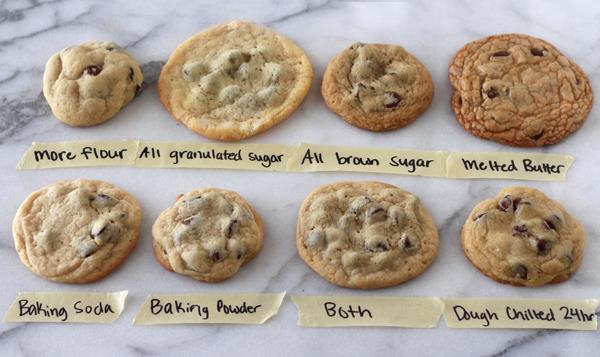This post originally appeared on Ozy.com.
You like soft and chewy. He likes thin and crispy. If only there were a chocolate chip cookie recipe that pleased everyone…
There is! And, no, it’s not Martha Stewart’s. It’s science.
We’ve taken our cues from a few spots: a bioengineering grad student named Kendra Nyberg, who co-taught a class at UCLA called Science and Food, and chef and cookbook author Tessa Arias, who writes about cookie science on her site, Handle the Heat.
There’s also an illuminating Ted Talk animation on cookie science. And if you really want to go nuts (or no nuts, your call), Serious Eats offers 21 painstakingly tested steps for the Perfect Cookie, including kneading times and chocolate prep techniques.
“Even though I can describe what I like,” says Nyberg, “I didn’t know the role of each ingredient in the texture and shape of cookies.” So she looked into it — as only a scientist can.
(MORE: His Grandfather Invented Doritos But Tim West Prefers Kale)
Here, relying on the experts’ help and based on the classic Nestle Toll House Chocolate Chip Cookie recipe, OZY presents no-fail tips for baking your perfect cookie. (You’re welcome.)
Ooey-gooey: Add 2 cups more flour.
A nice tan: Set the oven higher than 350 degrees (maybe 360). Caramelization, which gives cookies their nice brown tops, occurs above 356 degrees, says the Ted video.
Crispy with a soft center: Use 1/4 teaspoon baking powder and 1/4 teaspoon baking soda.
Chewy: Substitute bread flour for all-purpose flour.
(MORE: Food Waste – There’s (Finally) An App For That)
Just like store-bought: Trade the butter for shortening. Arias notes that this ups the texture but reduces some flavor; her suggestion is to use half butter and half shortening.
Thick (and less crispy): Freeze the batter for 30 to 60 minutes before baking. This solidifies the butter, which will spread less while baking.
Cakey: Use more baking soda because, according to Nyberg, it “releases carbon dioxide when heated, which makes cookies puff up.”
Butterscotch flavored: Use 3/4 cup packed light brown sugar (instead of the same amount of combined granulated sugar and light brown sugar).
Uniformity: If looks count, add one ounce corn syrup and one ounce granulated sugar.
More. Just, more: Chilling the dough for at least 24 hours before baking deepens all the flavors, Arias found.
(MORE: Table for One? This Question Will Never Terrify You Again.)
Read next: Watch Sir Ian McKellen Teach Cookie Monster About Self-Control
More Must-Reads from TIME
- Donald Trump Is TIME's 2024 Person of the Year
- Why We Chose Trump as Person of the Year
- Is Intermittent Fasting Good or Bad for You?
- The 100 Must-Read Books of 2024
- The 20 Best Christmas TV Episodes
- Column: If Optimism Feels Ridiculous Now, Try Hope
- The Future of Climate Action Is Trade Policy
- Merle Bombardieri Is Helping People Make the Baby Decision
Contact us at letters@time.com
